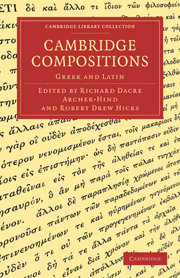TRANSLATIONS INTO GREEK VERSE
Published online by Cambridge University Press: 07 September 2010
Summary
LET not my cold words here accuse my zeal:
'Tis not the trial of a woman's war,
The bitter clamour of two eager tongues,
Can arbitrate this cause betwixt us twain:
The blood is hot that must be cool'd for this:
Yet can I not of such tame patience boast,
As to be hush'd, and nought at all to say:
First, the fair reverence of your highness curbs me
Prom giving reins and spurs to my free speech;
Which else would post, until it had return'd
These terms of treason doubled down his throat.
Shakespeare. Richard II. Act i. Sc. 1.Gaunt. Will the king come, that I may breathe my
last
In wholesome counsel to his unstaid youth?
York. Vex not yourself, nor strive not with your
breath;
For all in vain comes counsel to his ear.
Gaunt. O, but they say the tongues of dying men
Enforce attention like deep harmony:
Where words are scarce, they are seldom spent in vain,
For they breathe truth that breathe their words in pain.
He that no more must say is listen'd more
Than they whom youth and ease have taught to glose;
More are men's ends mark'd than their lives before:
The setting sun, and music at the close,
As the last taste of sweets, is sweetest last,
Writ in remembrance more than things long past:
Though Richard my life's counsel would not hear,
My death's sad tale may yet undeaf his ear. […]
- Type
- Chapter
- Information
- Cambridge CompositionsGreek and Latin, pp. 245 - 366Publisher: Cambridge University PressPrint publication year: 2009First published in: 1899



